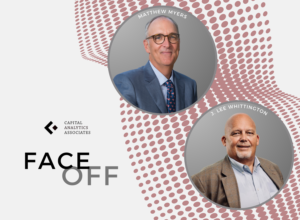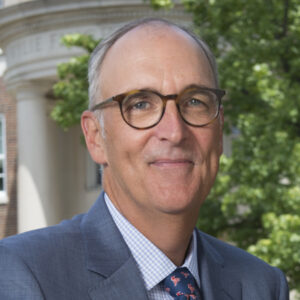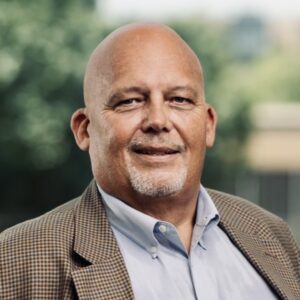 3 min read October 2023 — With the comeuppance of remote education opportunities, shifting student priorities and a growing need to prove ROI, higher education is currently faced with a dynamic environment. In conversations with Invest:, Matthew Myers, dean of the Cox School of Business at Southern Methodist University, and J. Lee Whittington, dean of the Satish & Yasmin Gupta College of Business at University of Dallas, discussed what this has meant for business education, current student expectations and what the future holds for their institutions.
3 min read October 2023 — With the comeuppance of remote education opportunities, shifting student priorities and a growing need to prove ROI, higher education is currently faced with a dynamic environment. In conversations with Invest:, Matthew Myers, dean of the Cox School of Business at Southern Methodist University, and J. Lee Whittington, dean of the Satish & Yasmin Gupta College of Business at University of Dallas, discussed what this has meant for business education, current student expectations and what the future holds for their institutions.
What is the current educational landscape with regard to business education?
 Matthew Myers, Dean, Southern Methodist University – Cox School of Business: “Higher education tends to work on a geologic time scale of speed change. That has to change. Business schools have to be able to move very quickly to bring more workforce development components inside of our executive education and our continuing education processes.
Matthew Myers, Dean, Southern Methodist University – Cox School of Business: “Higher education tends to work on a geologic time scale of speed change. That has to change. Business schools have to be able to move very quickly to bring more workforce development components inside of our executive education and our continuing education processes.
This is what we’re hearing not only from employers but from the city and surrounding counties. If we’re going to be able to contribute in the ways the community needs us to, we have to be a value-added component of the workforce development process for the region.
Until we’re able to do that, the challenge is always going to be right here in front of us. That’s one of the things we’re very excited about, not only because the new facilities are providing us with room to do more, but also because of the types of people that we’re hiring now.”
 Lee Whittington, Dean, Satish & Yasmin Gupta College of Business – University of Dallas: “The College of Business is facing a dynamic environment. With increasing opportunities comes intensified competition. In this hyper-competitive landscape, we find a multitude of private and public institutions, including SMU, TCU, Texas Wesleyan, Dallas Baptist, UT Arlington, UT Dallas, UNT and Texas Woman’s University. The online format further broadens the reach of universities like UT Austin and Baylor University. Furthermore, business education has low entry barriers, making it highly competitive.
Lee Whittington, Dean, Satish & Yasmin Gupta College of Business – University of Dallas: “The College of Business is facing a dynamic environment. With increasing opportunities comes intensified competition. In this hyper-competitive landscape, we find a multitude of private and public institutions, including SMU, TCU, Texas Wesleyan, Dallas Baptist, UT Arlington, UT Dallas, UNT and Texas Woman’s University. The online format further broadens the reach of universities like UT Austin and Baylor University. Furthermore, business education has low entry barriers, making it highly competitive.
When examining MBA programs, curricula often appear indistinguishable. All cover core subjects like accounting, finance, marketing and operations. This commoditization of business knowledge necessitates differentiation. We emphasize that what sets us apart is our faculty, who are not just academics but scholar-practitioners. We teach what we’ve practiced, and our commitment to ethics and character development further distinguishes us.
Our faculty publishes top academic journals while actively engaging in industry. This unique combination ensures our students receive practical, real-world insights. We prioritize hiring practitioners with relevant expertise to deliver a practical, experiential education. This approach sets us apart in a crowded market.”
What is your outlook for your business school over the next few years?
Matthew Myers: “SMU Cox is in a sweet spot right now. We just have so much support, so much momentum and so many great things going on. We’re willing to take risks. We’re willing to change. We’re willing to do things that modernize the way that we move forward. We understand that business changes almost daily, and we need to change with it, so the next three to five years for the Cox School of Business will be a transition point for us as we bring new programs online and find new ways of investing in ourselves.
At Cox, we’re starting student-led investment funds on the real estate and energy sides. Those investment funds will grow once they get to certain points, and we’ll take proceeds from those investment funds and reinvest them back into our scholarship funds.
We’re trying a lot of new, innovative ways to run the business school like a business to make SMU Cox an even stronger business school. I’ve said this often since I became dean of the Cox School, and I believe it’s true: ‘You can’t have a world-class city without a world-class university. And you can’t have a world-class university without a world-class business school.’”
Lee Whittington: “The College of Business is poised for the next two to three years in a highly competitive North Texas higher education landscape. Our focus is on solidifying our identity as a hub for cultivating virtuous leaders and providing practical business competencies.
Corporate partnerships with industry giants like Southwest Airlines, American Airlines and Fidelity have laid the foundation for our unique approach to business education. We understand the imperative need for organizations to prepare the next generation of leaders, especially with an aging leadership pool. Succession planning is essential, and we aim to complement and augment existing corporate in-house programs.
Our Center for Executive Education offers customized non-credit programs, providing flexibility for corporate partners. We’re keen on collaborating with businesses to enhance their talent development initiatives, capitalizing on our strengths in leadership and cybersecurity.
As the landscape remains intensely competitive, we’re staking our claim as a provider of character-focused, experiential education. Our approach sets us apart, and we’re committed to attracting students who value learning for its own sake and prioritize ethics and character development alongside business competencies. Our ongoing efforts to innovate and create distinct graduate business education programs will ensure we stand out in a crowded market.”
What separates your business school from other institutions?
Matthew Myers: “Cox School of Business is traditionally considered a very finance-heavy school, both at the graduate and undergraduate levels. That description is a little too generalized—a lot– of our students who study finance are focused on specific areas that we think are key differentiators for Cox.
For example, we have an institute called the McGuire Energy Institute which traditionally was focused on oil and gas, but now it’s much more integrated inside of the transitional energy market space—solar, blue hydrogens, green hydrogens, carbon capture, etc. There are finance majors who are actually energy finance majors that are working across an increasingly modernized industrial energy spectrum.
The same is true for real estate. Real estate markets have changed tremendously over the past decade. We have one of the top real estate institutes in the country inside of the Cox School, and we’re focusing on the modernization of the real estate industry, whether it’s finance students, supply chain students or logistics students.
The way that we’re looking at business education over the next few years is that it’s going to look very different than it has in the past.”
What are some of the evolving expectations of students regarding their college experience?
Lee Whittington: “This is interesting. When we talk to parents of prospective students, parents frequently focus solely on the instrumental value of education, wondering what job their child will secure after graduation. However, I believe that we should prepare students not just to earn a living but to learn a living. This is important because jobs are evolving, and many future careers do not even exist yet. While we teach core competencies such as accounting, finance, marketing and operations in business, we also emphasize the importance of learning how to learn. This adaptability will be crucial as technology and job environments continually change.
Carol Dweck’s book, “Mindsets,” distinguishes between fixed and growth mindsets. We aim to instill a growth mindset in our students, encouraging them to take on new challenges and expand their horizons. Having a fixed mindset can be a liability in a world of constant change.
At the Satish & Yasmin Gupta College of Business, ethics is not just a checkbox requirement. Ethics is embedded throughout our curriculum at every level, from undergraduate to graduate programs. It’s not just a course; it’s integrated into every syllabus, demonstrating our commitment to ethical education.
Furthermore, we are working on cultivating virtuous leaders. This goes beyond teaching ethics; it involves shaping students’ character, so they are equipped to make responsible decisions throughout their lives. As we move forward, this focus on character will become even more integral to our business education philosophy. We believe it’s crucial to prepare students not just with competencies but with strong character, after all character is the foundation that sustains talent and giftedness in the long run.”
For more information, visit:

